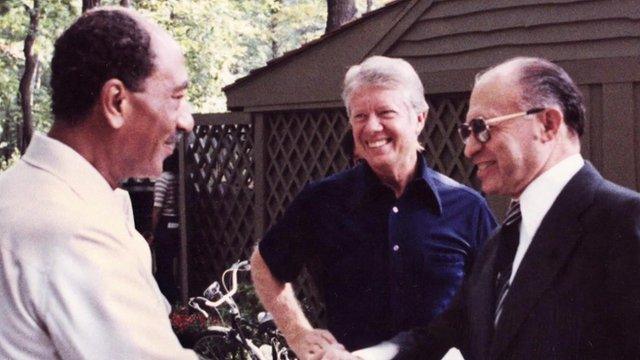Jimmy Carter: Born-again statesman
- Published
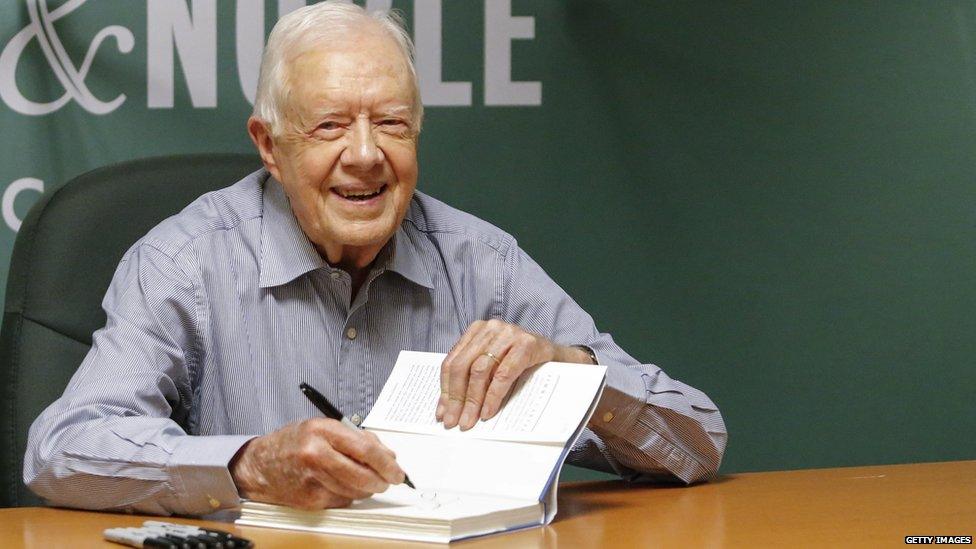
Former US President Jimmy Carter is now remembered for more than his time in the White House.
When, in 1977, James Earl Carter Jr blew into Washington DC "like a Southern breeze", the 39th President of the United States symbolised a bright, new future.
He'd emerged from the obscurity of a peanut farm in his native Georgia as a man of honesty, armed with the slogan "Trust Me".
With the country still reeling from the Watergate scandal, this platform had much appeal. With unprecedented informality, he insisted on being called Jimmy, and he and his wife Rosalynn walked hand-in-hand from Capitol Hill to the White House on Inauguration day.
Yet, Jimmy Carter was dumped from the presidency after serving just one four-year term, the first elected president to be defeated in office since 1932. But in the more than 30 years since, his second act as a world statesman has changed his legacy.
Political upstart
Born in Plains, Georgia in 1924, as a child, Jimmy was expected to work long hours on the farm, and home life was austere. His nearest neighbours were his black staff who became his closest friends.
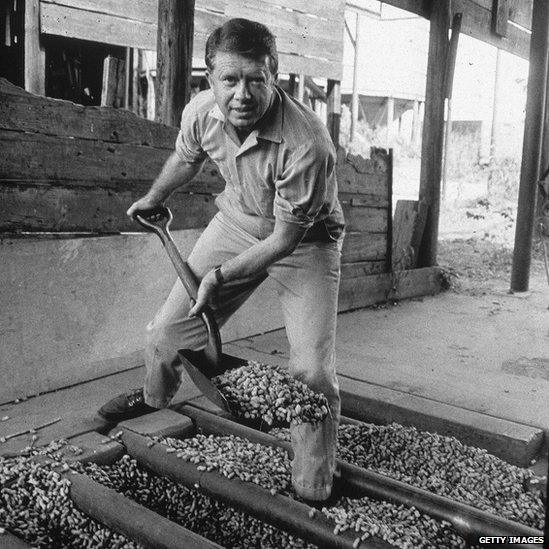
When his father died of cancer, Jimmy Carter abandoned a seven-year career in the navy as a submariner to take control of the family farm. He turned its fortunes around and became wealthy in the process.
He entered politics in the 1960s, elected first as Georgia state senator during a special election - starting his campaign only two weeks before voting. After an initial defeat for the governorship of Georgia, he was elected to the state's top office in 1970 - a position he would use as a springboard to the White House.
As a office holder, Mr Carter was driven by a mixture of born-again Christian spirit, a sense of independence and a liberal tradition. The latter was inherited, not from his father, who was a white segregationist, but from his mother, Lillian, who joined the Peace Corps at the age of 68, and spent two years working as a nurse in India.
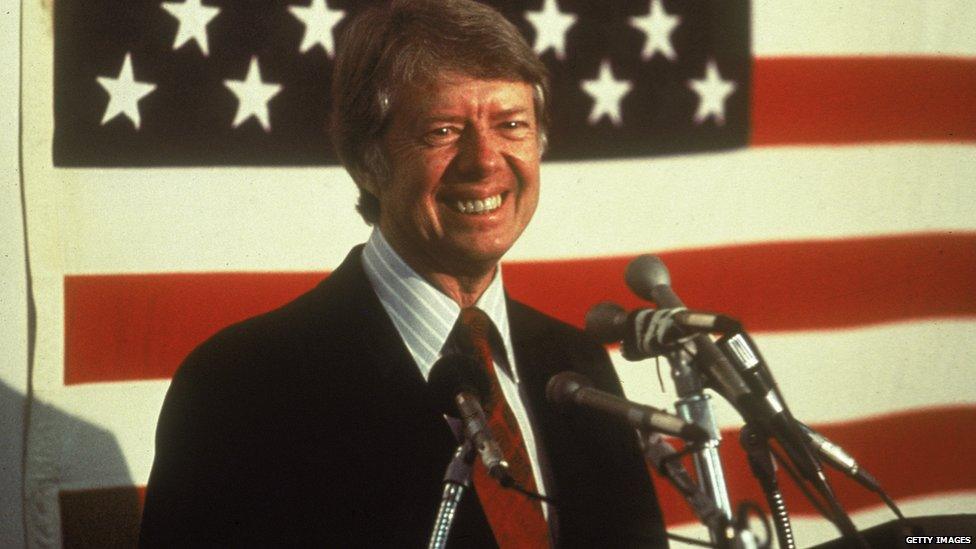
His sister, a faith healer, had by then convinced him to commit himself totally to God. As president, he continued to preach at Sunday school for children and always said grace before meals, even at state dinners with foreign leaders.
Difficult presidency
After a narrow election victory against incumbent Gerald Ford in the 1976 presidential election, problems quickly mounted for Mr Carter. At home, the oil crisis had produced high inflation and unemployment, and he struggled to persuade Americans to accept the required austerity measures.
The high-point of the Carter years was the signing of the Camp David Accords in 1978 in which Egypt formally recognised the state of Israel. He also signed a treating returning the Panama canal to Panama.
But subsequent events conspired against him. First, the Shah of Iran was overthrown and 66 Americans were taken hostage in Tehran. Then the Soviets invaded Afghanistan.
The resulting US boycott of the 1980 Olympic Games in Moscow failed to gain enough support to get them cancelled. He cut off diplomatic relations with Iran and introduced a trade embargo.
But the public did not believe he was being tough enough and his popularity slumped. When an attempt to rescue the hostages failed, and eight Americans military members were killed, Carter appeared even weaker.
To compound his plight, Iran delayed the release of the hostages until after the new president, Ronald Reagan, was sworn in. It was left to Reagan to make America feel good about itself once more.
Next act
Instead of disappearing, Jimmy Carter used the prestige of his former office to become a diplomat and mediator across the world under the auspices of his newly founded Carter Centre, based in Atlanta.
He worked behind the scenes to keep the Middle East peace process on track, persuaded the former North Korean dictator, Kim Il Sung, to open discussions with South Korea.
Mr Carter led a delegation that persuaded leaders in Haiti to surrender power in 1994 and he brokered a ceasefire in Bosnia that helped pave the way for the future peace treaty there.
He very quickly added election monitoring to the Carter Centre, famously denouncing the 1989 election in General Noriega's Panama. He then advised Daniel Ortega on organising fair elections in Nicaragua which, ironically, resulted in Ortega's defeat.
The Carter Centre has also established health programmes which pushed for the eradication of guinea worm, and is successfully tackling river blindness.
Elder statesman
As Mr Carter continued working across the world, his reputation as a failed one-term president soon began to subside.
Such is his worldwide standing after leaving office, Fidel Castro allowed him to broadcast live to the Cuban people in Spanish, despite knowing he would criticise the Cuban leader's civil rights record.
Mr Carter is not without his critics. Some non-governmental organisations working in the field have accused him of often acting unilaterally and have questioned his commitment to longer-term projects.
In 2002, he was awarded the Nobel Peace Prize for his "decades of untiring effort to find peaceful solutions to international conflicts".
The Elders took questions from students from around the world
In his acceptance speech, Mr Carter said "war may sometimes be a necessary evil. But no matter how necessary, it is always an evil, never a good. We will not learn how to live together in peace by killing each other's children".
The former president has spoken out against some decisions that were made after his presidency - including the war in Iraq under George W Bush and mass surveillance under Barack Obama, saying Edward Snowden should be considered for a pardon.
He has also criticised Israel's actions with respect to Palestine in a 2006 book "Palestine - Peace not Apartheid", which attracted criticism from many elected leaders in his own Democratic party.
Since 2007, Mr Carter has also become a part of The Elders, a group founded by Nelson Mandela of elder global leaders who no longer hold public office, along with Kofi Annan, Ela Bhatt and Mary Robinson.
In August 2015, Mr Carter announced cancer initially found in his liver had spread to become a melanoma in four spots on his brain and that he was to undergo treatment. In December that year he told a Sunday school class in Plains, Georgia, that an MRI scan had revealed no sign of the brain cancer.
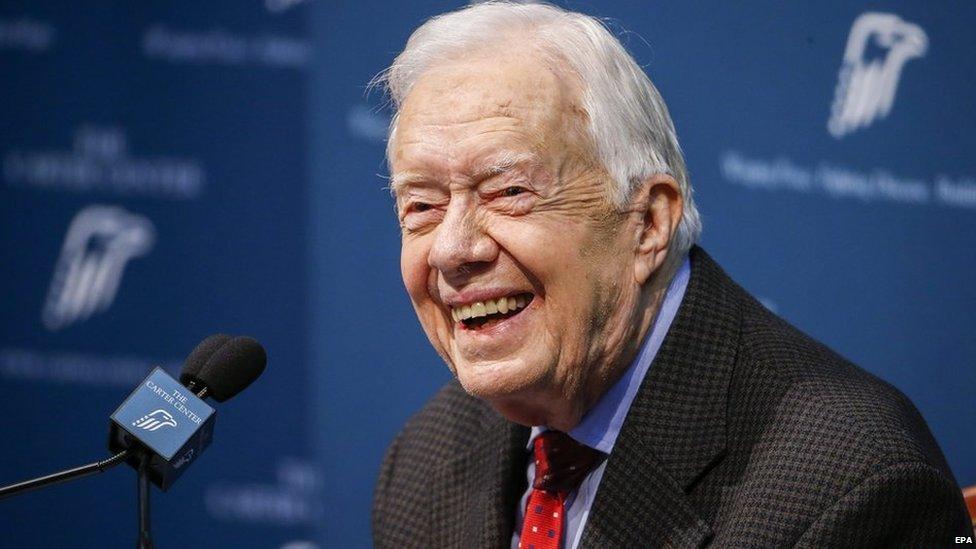
Related topics
- Published20 August 2015
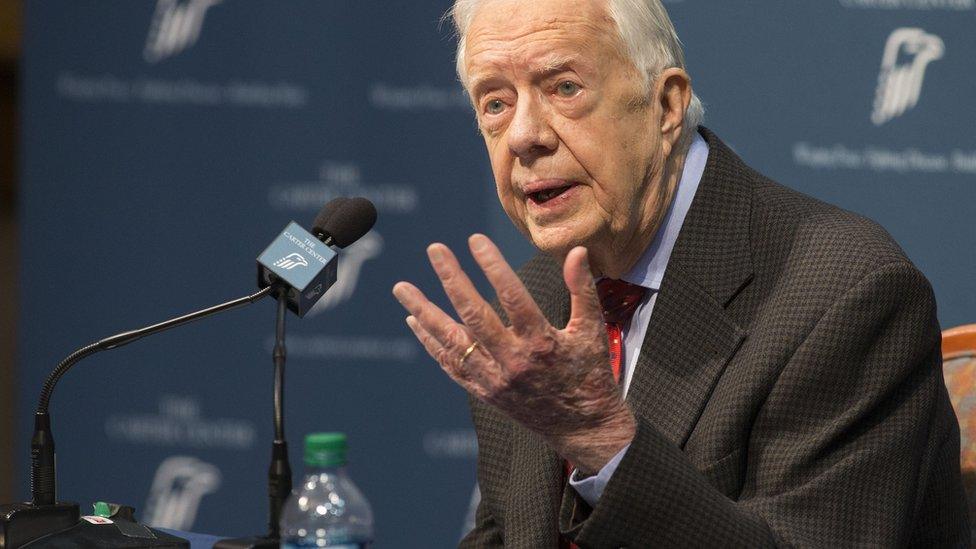
- Published20 August 2015
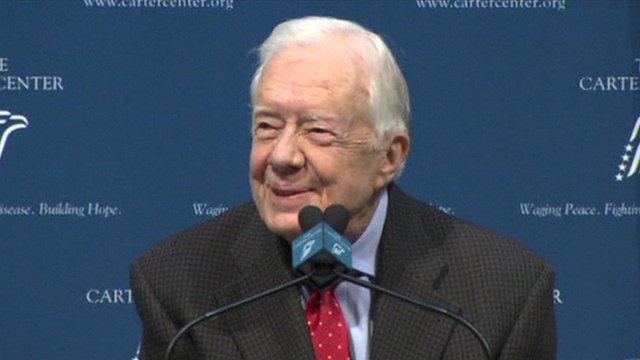
- Published4 April 2014
